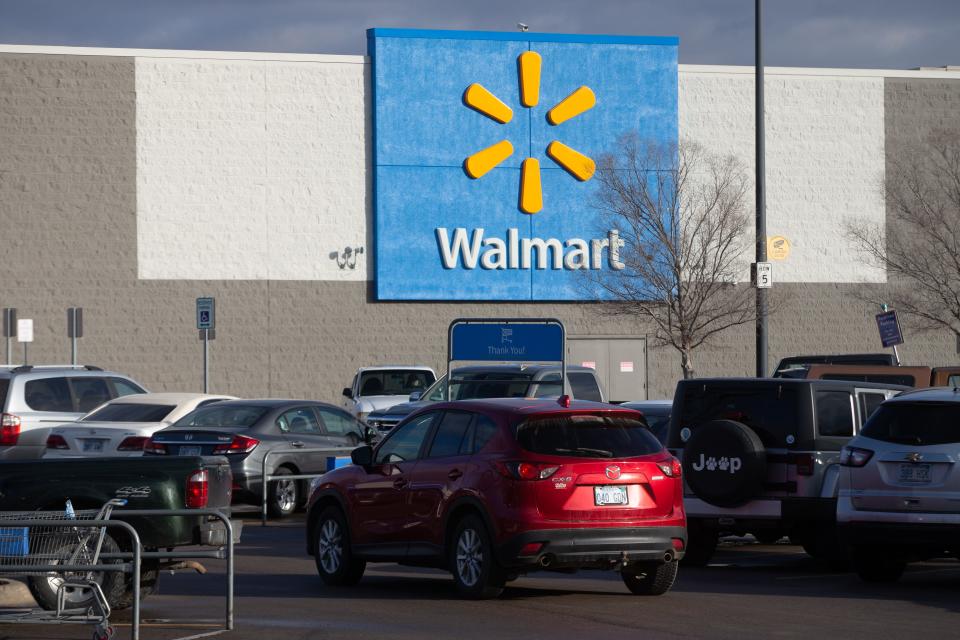Did your groceries get double taxed at Walmart in Kansas? Here's how to get your cash back

Grocery shoppers who were overtaxed when the food sales tax cut was implemented will have to return to the store to get their money back, state tax officials said.
Customers reported Walmart stores in Topeka and elsewhere had double-taxed food items following Sunday's reduction in the state food sales tax rate.
Walmart receipts showed two tax lines, one with the full 6.5% state sales tax rate, plus local taxes, and the second line with the lower 4% state rate on food, plus the local taxes.
The receipts showed the second tax line correctly assessed the lower tax rate on food items. However, the first line showed the full rate was assessed on the entire purchase, including food, meaning that customers paid taxes twice on food.
The problem has since been corrected.
"On Jan. 1, after the reduced state sales tax rate on food items went into effect in Kansas, some customers were mistakenly charged the higher, outdated rate, along with the new rate," said Walmart spokesperson Ashley Nolan. "The issue has been resolved, and we apologize for any inconvenience.
"Customers seeking a refund or with questions should bring their receipt to their local Walmart store and speak to a member of management."
Similar problems haven't been reported at other grocers.
Jon McCormick, president of the Retail Grocers Association, said such missteps can happen when programming the point-of-sale system. The association represents independent supermarkets, and McCormick said he hasn't heard of similar incidents at member stores.
"My members have adjusted their POS systems to follow the new regulations," he said.
Kansas Department of Revenue officials said Tuesday that the agency was "aware of a programming issue that various Walmart stores encountered related to the state sales tax reduction on groceries. The retailer has since resolved the issue."
It is unclear how widespread the issue was, but Nolan said all Walmart stores in Kansas were told how to process refunds.
"If a customer did not see that reduction on approved grocery items, they should seek a refund for the excess tax charged by visiting the retailer with a valid receipt," KDOR officials said in a statement.
More:Your grocery bill is about to get 2.5% cheaper as Kansas food sales tax cut starts
Kansas and local sales tax rates
Kansas has a 6.5% sales tax. Food was supposed to be charged that full rate up until Jan. 1, when the first installment of the state's food sales tax cut reduced the rate to 4%. Non-food items are still assessed at 6.5%.
Your receipt will show a higher tax rate than 6.5% or 4% because there are also local taxes.
In most of Topeka, sales taxes on non-food items are 9.15% and 6.65% on food. That includes a 1.15% county tax and a 1.5% city tax.
Certain areas of the city have higher rates due to additional 1% or 2% taxes to fund community improvement districts and STAR bonds, raising the tax rates to 10.15% and 11.15%.
The rate doesn't yet include an additional 0.2% tax approved by voters in November to benefit Gage Park, the Topeka Zoo and the Kansas Children's Discovery Center.
Local sales tax rates effective Jan. 1 are available online from the Kansas Department of Revenue.
More:Vote means 'lots of good things on horizon' for Gage Park, Topeka Zoo, Discovery Center
Full elimination of food sales tax on Kansas horizon
The Kansas Department of Revenue issued a tax notice Dec. 1 and a publication detailing the changes. At the time, the governor's office and KDOR touted their work with the retail grocery industry to educate grocers on tax changes.
"Even after providing the educational materials and opportunities as it rolls out these changes, KDOR continues to be available to retailers to ensure the transition to these sales tax savings is as smooth as possible," Revenue Secretary Mark Burghart said in a Dec. 2 statement.
The lower tax applies — according to the law's definition of food and food ingredients — to solid, liquid, frozen and other items "sold for ingestion or chewing by humans and are consumed for their taste or nutritional value." That includes bottled water, candy, dietary supplements, food from vending machines and soft drinks. Alcohol and tobacco aren't included.
Prepared food, such as restaurant meals or a cooked rotisserie chicken at a grocery store deli, are generally still taxed at the full rate.
More:Laura Kelly again pushes food sales tax cut. Can she convince entrenched Republicans?
The food tax is scheduled to reduce to 2% in 2024 before hitting zero in 2025. Gov. Laura Kelly, who campaigned extensively on axing the food tax, has called for lawmakers to take up the issue again this year to eliminate the tax immediately.
The earliest possible date would be April 1.
McCormick, of the Retail Grocers Association, advocated for the Legislature to pass Kelly's proposal to reduce the food tax to 0% this spring instead of two years from now, arguing it would benefit Kansans and retailers.
"That is the best scenario for families who buy food staples in lieu of going to a restaurant which carries high markups and makes food more expensive," McCormick said. "The Legislature is choosing to ignore the 'common folk' in their districts over the elite residents of Kansas."
This article originally appeared on Topeka Capital-Journal: Kansas Walmart customers double taxed on food at Topeka grocery stores
